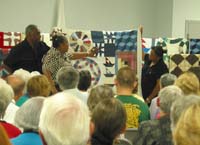Pre-Civil War Quilts May Have Pointed the Way to Freedom
Pre-Civil War Quilts May Have Pointed the Way to Freedom

Prior to the Civil War, abolitionists worked with slaves to build an intricate underground railroad. The railroad was actually a network of safe houses where slaves could seek shelter on their way to freedom in the North. Abolitionists were known as the conductors and slaves as the passengers. Quilts played a very important role in the success of the Underground Railroad.
Clarice Boswell is a descendant of slaves and she travels around the United States relating stories about the quilts of the Underground Railroad that she learned from family members. She grew up around Shelbyville, Ky., but now resides in Illinois. Boswell recently returned to the Commonwealth to make a presentation to Jessamine County Extension Homemakers about the secret codes in slave quilts, based on her book, “Lizzie’s Story: A Slave Family’s Journey to Freedom.” The presentation included a display of replica quilts and some authentic quilts dating as far back as 1860.
“A lot of them [slaves] would leave and not know where they were going or who they could trust, but the abolitionists knew who they could trust,” she said “The abolitionists went from plantation to plantation taking a census of how many people were there and what the whole scenario was like, and that’s how the slaves learned what the codes were. The masters didn’t know the strength of the abolitionists and that’s why it was successful.”
She said some slaves memorized a poem to help them remember what the quilt patterns meant. Part of the poem may have been as follows, “The monkey wrench turns the wagon wheel toward Canada on the bear’s paw trail to the crossroads.”
Many believe abolitionists displayed quilts on clotheslines, fences, or in windows to relay specific messages, instructions and/or warnings to slaves on their way to freedom. For example, a monkey wrench pattern meant slaves could stop there and gather tools they might need on their journey; a wagon wheel pattern told slaves to pack anything they would need to survive the trip; and a flying geese pattern told slaves to follow migrating geese north toward Canada.
The drunkard’s path pattern had nothing to do with alcohol, but it was a warning to slaves to move in a staggering fashion to elude anyone who may be following them.
During her presentation, Boswell sang spiritual songs that would’ve been sung by slaves on their journey. She told stories of her family’s enslavement, escape and success at finding freedom. She believes when a slave family reached freedom they would receive a quilt with a ring of roses pattern. Boswell said each time she sees the Kentucky Derby winner receive roses, she thinks of how her family gained their freedom. She believes it’s very important to tell the story of the quilts and their symbolism to as many people as possible.
“I think it’s important because my audience has not heard the history from a black perspective,” she said “The history books have only told a smattering of what it was really like and I try to tell a smattering of some good and some not so good. This is history that wasn’t really recorded.”
Jessamine County Cooperative Extension Agent for Family and Consumer Sciences Marisa FitzGerald said she felt lucky to have Boswell visit and speak. She said the event attracted visitors from beyond Jessamine County. Nearly 100 people watched Boswell’s demonstration.
“We have a large quilt group and a large interest in quilts in the county,” she said. “This takes a different spin and a different look on quilts. Not only are they an heirloom you can pass down, but they are also a part of history as far as the Underground Railroad. It’s very significant, not only for the African American population but for everyone in the area.”
Clarice Boswell is a retired administrator and teacher of the University of St. Francis in Joliet, Ill.